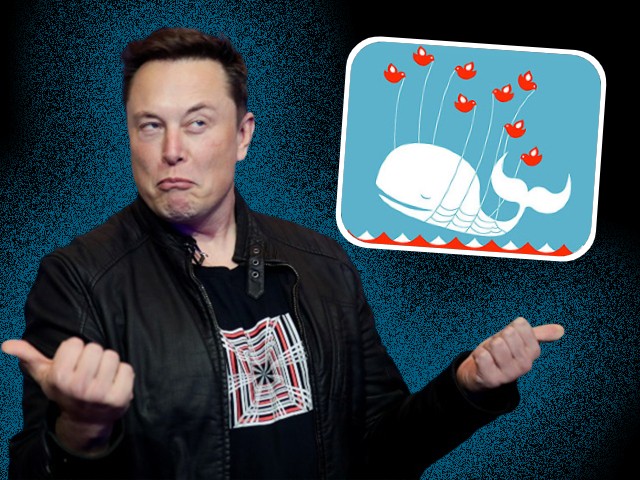Remember the Fail Whale? Back in Twitter’s early days, the service was so unreliable that its “overcapacity” icon–an illustration of a bevy of birds tethered to a whale caught in a net—became almost a better-known symbol of Twitter than its bird logo.
It was never really clear what was happening in that illustration. Was the weight of the whale dragging the birds into the ocean, pulling their tweets underwater? Had the birds captured the whale in their net and were now flying off with their ensnared prey? Were the tethers really the whale’s webs that had shot out—Spiderman style—and grabbed hold of the birds? Were the birds rescuing the whale?
The Fail Whale was brought back to mind today when shares of Twitter fell below $39.91, where they closed on April 1, the last trading day before Elon Musk announced he had acquired a big stake in the company. Shares fell 8.1 percent and closed on their low at $37.39. The shares were down early in the day after Elon Musk tweeted over the weekend that he had been told by Twitter’s lawyers that he had violated his nondisclosure agreement with the company with some of his tweets challenging management data on the population of spambots on the service. It’s not that this was really all that, bad but it certainly seemed to indicate that the deal is not going smoothly.
A few hours after markets opened, however, Bloomberg News reported that Musk had said during a Miami tech conference that renegotiating the price of his acquisition was not “out of the question.” (The conference, by the way, was sold out at $7,500 a ticket. Musk appeared remotely.) We have said several times now that we expect Musk might attempt to lower his purchase price given the turmoil in the stock market that has hit last year’s high-flying tech shares hard. Shares of Snap, for example, are down 37.4 percent since April 1, when—in an odd bit of market symmetry—they closed at $37.39. If Twitter shares had followed a similar trajectory—which seems likely absent a takeover offer—they’d be trading around $25 right now. No one thinking to buy Twitter today would put in their opening offer at $54.20.
Empire State of Mind
The dramatic shift in consumer spending away from services and into goods has benefited U.S. manufacturing, but Monday’s report from the New York Fed raises the possibility that ongoing supply chain woes and rising prices may be taking their toll. The Empire State index of manufacturing activity nosedived 36.2 points to a reading of negative 11.6 in May, as the measures of orders and shipments crashed. Even more disturbingly, this took analysts by surprise. They had forecast a slight decline from a reading of 24 to around 18 or so.
Lloyd Blankfein, the former chairman and chief executive of Goldman Sachs, might have been less surprised. Over the weekend, Blankfein said there was a “very, very high-risk factor” that the U.S. is headed for a recession.
Homebuilders Getting Sadder
We expect the slump in homebuilder sentiment to continue in the May survey scheduled for release Tuesday. The April survey showed builder sentiment sinking amid surging mortgage rates, inflation in building materials costs, and rising labor costs. There’s been no let-up on the commodities inflation side or the labor market. The expectations for interest rates are materially higher than a year ago. That’s likely to have home builders feeling worse than they were in April.
